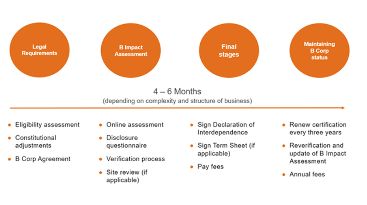Companies, and particularly consumer brands, are seeking to show greater transparency in respect of their impact on society and the environment. One way that businesses can do this is by gaining 'B Corp' status.
What is a B Corp?
Launched in the United States in 2007, B Corporation is a desirable certification of social and environmental performance and public transparency: the 3,300 certified B Corp companies across the globe strive to build a better and more ethical world.
B Corp certification is assessed by the non-for-profit B Lab and is granted to for-profit organisations that achieve a minimum score against a set of social and environmental standards. By imposing a legal standard, B Corp certification ensures that companies will 'meet the highest standards of verified social and environmental performance, public transparency and legal accountability'. It acts as a clear marker of a company's commitment to corporate social responsibility, ensuring that its intention to become a purpose-led business is engrained into its constitution. Companies in 72 countries and in a vast array of industries have committed to take this 'triple-bottom line', or the 'three Ps', approach to business, balancing profit, people and the planet.
After success in the United States, the B Corp initiative launched in the UK in 2015. To date, there are around 425 B Corps in the UK. These include household names such as Ella's Kitchen, the Guardian Media Group, Innocent and Alpro amongst many others (view a full list of B Corporations here).
Why should a company become a B Corp?
As we become more environmentally aware of purchases we make, consumers and employees want to associate with companies that consider their social, environmental and community impact. A survey conducted by B Lab in 2020 found that 72% of UK adults believe that businesses should have a legal responsibility to the planet and people, in addition to the maximisation of profits. This sentiment is likely to grow, particularly in light of the Covid-19 pandemic which has seen an increased consumer concern for society and the environment.
"72% of UK adults believe that businesses should have a legal responsibility to the planet and people"
Revenue Growth
There is strong evidence that certification drives performance. UK B Corps reported an average revenue growth of 14% year-on-year since launch in 2015. There is an overriding message that people want to buy from businesses they believe in and whose values align with their own.
As well as the potential increase in revenue, becoming a B Corp may also generate positive reputational effects and differentiate companies from their competitors. In the consumer market, a number of major retailers have actively been showing support for B Corps with Ocado, Waitrose and Boots each creating 'B Corp' only digital shopping aisles.
A focus on fashion and beauty brands.
The ethical dimension of building a fashion and beauty brand is now a top priority.
As a result of the report from the Intergovernmental Panel on Climate Change and the Beauty Council's 2020 Report 'the Courage to Change: Sustainability Report', many brands are under scrutiny for their contribution to climate change. Experts want to see comprehensive, aggressive and urgent efforts from brands that focus on full-spectrum and whole-system changes.
In our recent campaign, 'Defining Moments', doyenne of the retail world, Mary Portas, described the seismic shift that has hit our consumer society and the 'Covid conscience' that has driven us to a 'kindness economy' and a revaluation of how we live and operate. As she notes, "we're seeing the floods, we're seeing the fires, we're seeing what's happening across the world" and the realisation is that we need to create "businesses that look after our people and our planet as well as profit".
B Corps may be the solution for many reasons - they are a demonstrable way to reaffirm a brand's shift to sustainable and ethical practices that encompass transparent supply chains, better labour practices and a 'give back' model. Obtaining and maintaining a B Corp certification can help fashion and beauty brands to both ensure that their operations are up to par and to alert sceptical consumers of the fact. There is therefore also an indisputable marketing element at play for B Corps in the way that it can strengthen a brand's reputation globally as a sustainability-minded company. Moreover, the badge ensures that a brand remains relevant and appealing to customers, building goodwill and attracting consumers in a saturated market. In October 2021, the iconic brand Chloé announced it had achieved B Corp status, making it the first luxury Maison to do so. This defining event is sure to pave the way for many more luxury fashion brands to follow suit.
B Corp certification signals to investors that a business is beginning to measure and manage its social and environmental performance and will be held accountable to these objectives. The standards required for B Corp designation demonstrate a genuine commitment to social and environmental ambitions and excellence - this authenticity is vital in a market often criticised of 'greenwashing'.
By way of example, Vestiaire Collective, a luxury resale platform, raised $216 million in a funding round in March 2021. Part of the company's manifesto to its current and prospective investors was its intention to become B Corp certified, which it then went on to achieve in September 2021.
B Corps are an equally appealing asset in the M&A market, with Nestle acquiring a majority stake in B Corp Mindful Chef in November 2020.
"Corporate responsibility is no longer a nice-to-have for the generation of new hires"
Attracting and retaining talent
Corporate responsibility is no longer a nice-to-have for the generation of new hires; it is a business imperative. B Corp certification can assist in the attraction and retention of high-quality talent. The latest Deloitte millennials survey found that 74% of millennials would leave employment in companies that did not prioritise having a positive impact on local communities in the next 5 years.
Who can become a B Corp?
Any UK business will be eligible for B Corp certification as long as they can demonstrate that:
- It generates the majority of its revenue from trading;
- It competes in a competitive marketplace;
- It is not a charity; and
- It is not a public body or otherwise majority owned by the state.
Companies limited by shares or guarantee, community interest companies, co-operatives and limited liability partnerships are all able to apply. Certification covers a wide range of sectors, ranging from food and drink to the legal and financial services.
As B Corp certification is retrospective, companies also require a 12-months of revenue and trading history to apply. However, this is not to say that B Corp status is just for long-established companies. We recommend that any pre-revenue start-ups that are interested in B Corp status engage with B Lab's impact assessment tools and begin building policies into the business, ensuring efficiency in the application process further down the line. Early-stage companies may also pursue 'Pending B Corp' status, designed to set a start-up on the path to full Certification.
How does a company become a B Corp?
B-Impact Assessment
The initial step is the completion of an online assessment, which considers five areas of impact:
- Governance,
- Community,
- Workers,
- Environment and
- Customers.
Business size, sector and industry determine the number and type of questions in the B-Impact Assessment. Companies with sensitive practices are also required to complete a disclosure questionnaire.
B Lab then assesses and verifies that your score meets the certification standards of at least 80 out of the 200 points available.
The process highlights the company's weaknesses, offering a roadmap to more positive and sustainable business practices.
Legal Requirements
A company must demonstrate its legal accountability by amending its constitutional documents in a way which requires its board of directors to consider both the company's shareholders and its stakeholders when making decisions. This is achieved by including a prescribed objects clause in the company's articles of association.
"A company must demonstrate its legal accountability by amending its constitutional documents"
The amendments required include:
- an objects clause confirming the company's commitment to; (i) stakeholder interests; and (ii) a material positive impact society and the environment;
- a reiteration of the duties of the company's directors under section 172 of the Companies Act 2006 and further wording that ensures no particular stakeholder interest takes precedence over any of the others; and
- an obligation on the directors to prepare an annual impact report, comprising of a balanced and comprehensive analysis of the impact of the business on society, the environment and the local community.
In addition to passing a board and special resolution in order to amend the articles of association, companies will also need to consider whether other constitutional documents (including any shareholders' agreements) restrict or require further consents for this amendment.
Alternatively, a business can sign a term sheet instead of amending its constitution. However, this will score lower in the B-Impact Assessment, compared to companies who have explicitly included the objects clause in the company's articles of association.
Finally, the company will need to sign a declaration of interdependence: a statement encompassing the B Corp value system and shared vision for the future.
Maintenance of B Corp status
B Lab ensures that companies continue to meet impact standards, even as they grow or change, by requiring B Corps to recertify every three years. In order to maintain their status, companies must retake the B Impact Assessment and provide verification for their answers.
As part of this recertification process, certain companies (including all public companies and wholly owned subsidiaries of public companies) will be selected for an in-depth site review to verify and confirm the accuracy of the responses in their impact assessment.
There is also an annual fee, which scales with revenue and starts at £500.
It is worth noting that it is possible to relinquish the certification, as Etsy did in 2017 in order to maintain its corporate structure. Once a company has renounced their B Corp status, it will need shareholder approval to remove the B Corp related provisions from its articles.

To view the image in full resolution please click here.
How can we assist you?
Withers can advise your company on the certification process and whether B Corp status is suitable for your business given its corporate structure, aims and values. The Corporate team can help your company to meet the legal requirements for certification by reviewing contractual arrangements and drafting amendments to the company's articles of association and corporate authorities.
If you would like to discuss the B Corp process, or have any questions in relation to the above, please contact us.
The content of this article is intended to provide a general guide to the subject matter. Specialist advice should be sought about your specific circumstances.

